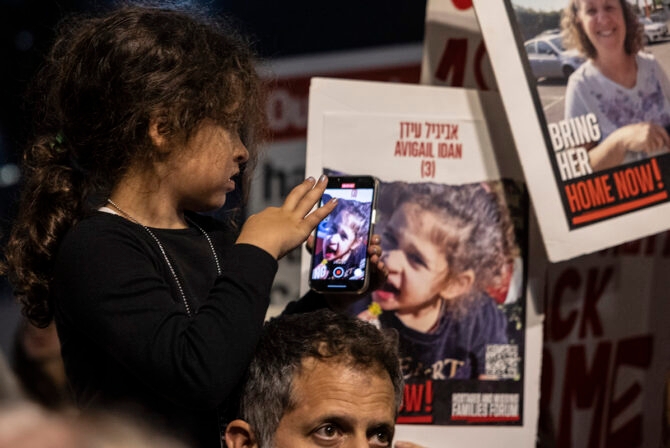Growing up in Atlanta, I had the privilege to live down the street from a couple named Randy and Caroline Gold. I was only a small child, but remember when they moved into their white picket fenced house, gave birth to their son, Natanel, and a few years later, had their daughter, Eden.
Whether I was walking by their house on Shabbat, being a summer camp counselor to Natanel, or bringing them mishloach manot on Purim, needless to say, I saw them a lot. As the years passed and I grew older, I remember noticing that Eden was different from other kids. Although she was an adorable, beautiful little girl, her reactions were not quite the same as other children her age.
When I asked my mother what was wrong with Eden, she explained to me that she had a rare genetic disease that caused her to be developmentally delayed, and unable to walk or talk. In a basic way that I could understand, my mother explained how a genetic disease was passed down from parent to child and how a child’s genetics was really the luck of the draw. Meaning, two healthy adults could get married, have a healthy child, and, in the Gold’s case, have another child who was affected with a genetic disease.
Not knowing what else to say, I accepted this harsh reality of the world. By the time I was in high school and had learned more about genetics, I remember asking my mother why the Golds didn’t get tested before they got married. To which she responded, much to my surprise, they had been tested. Before they got married, Randy and Caroline went to their doctors and were screened like many young Jewish couples before them. However, they were only screened for a handful of diseases, not including Mucolipidosis type IV, which they ultimately ended up passing on to Eden.
To this day, I remember my panic—how do you know if you’re being tested thoroughly and accurately? In response, my mother told me about an initiative inspired by stories such as the Golds’ that would help young couples get screened properly. That was the first time I heard about JScreen.
Fast forward to my senior year of college. I was home for Rosh Hashanah and in Costco, as most of us find ourselves before any big holiday, waiting in the seemingly endless check-out line. Looking behind me, I saw none other than my former neighbor, Caroline Gold. At that moment, a light bulb went off in my head. As the president of the Yeshiva University Student Medical Ethics Society, I saw this moment as my chance to make a difference. After all, I was in the position to facilitate genetic screening at my school, while Caroline could help put me in touch with the right people there to get that done. Within the next few days, I was already talking to JScreen about coming to New York and screening at Yeshiva University.
Although the Medical Ethics Society has done genetic screening in the past through other institutions, JScreen genetic screening was different. Rather than using blood, JScreen uses saliva to test for 100+ genetic diseases, more than we’d ever screened for. As a result, this process is quicker, easier, and less invasive.
The Jewish Genetic Disease Consortium confirmed that the Yeshiva University event was the largest screening event since the community-wide Tay-Sachs screenings in the 1970s and 80s.
Over a three-day span, we were able to screen almost 1,200 people!
I actually got screened when the Medical Ethics Society offered testing two years ago through another organization. However, I opted to get screened again this time around because that testing only had 40 diseases on the panel. As someone who was running this screening, as well as someone who got screened, I am beyond impressed and amazed at how efficient and all-inclusive the JScreen process was. From the sweet welcome email to the final conversation with the genetic counselor explaining the results, JScreen went above and beyond.
Many people expressed to me how thankful they were that we were able to provide this unique opportunity. One of my friends said, “I think it’s amazing what JScreen has done. They are allowing us the ability to become proactive about our futures and giving us the knowledge to create the best lives for ourselves possible.”
Another student commented on how “easy” the whole process was. As someone who wants to be a genetic counselor, she was telling me how important it was that we created the dialogue for people to become aware of how crucial it is for everyone to get tested.
What impressed people the most, however, was how rapidly JScreen reported results back and the professionalism of the genetic counselors. One student’s feedback was, “My consultation with the JScreen genetic counselor was extremely helpful in understanding my test results. She was knowledgeable, patient, and courteous when discussing my case with me.”
Genetic screening is something that people may not recognize the importance of until it’s too late. We had the opportunity to reach our peers at a critical time, before they have children, and educate them about their own risks and options. The impact that our screening had on the greater Jewish community is incalculable—the fact that we were able to make such an impact proves that anyone anywhere can make a difference. This positive traction should continue into every other Jewish community in the U.S., which is why each one of us should do what we can to get involved, whether it’s through volunteerism, donations, or encouraging friends to get screened.
I am proud to have been a part of this project, indebted to JScreen for everything they have done to help us, and amazed at the outcome of the event. Most importantly, I am awed by families like the Golds who have the vision, determination, and strength to see past their own circumstances to create a better future for the Jewish people.
For information about genetic screening and to request educational materials or programming for your congregation, please visit JScreen.org or email info@jscreen.org.
Read More:
These Brutally Honest Parenting Comics Will Make You Laugh (And Cry)
The Inspiring 5-Year-Old Girl Who Was Paralyzed After Performing Backbend
These Moms Dance to ‘Ice Ice Baby’ with Their Babies And It’s Amazing








